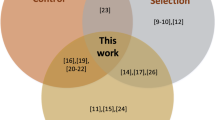Abstract
In this paper, we propose an approach to solve the power allocation issues in a DS-CDMA cellular system using genetic algorithms (GAs). The transmitter power control has proven to be an efficient method to control cochannel interference in cellular PCS, increase bandwidth utilization and balance the wireless services. Most of the previous studies have assumed that the transmitter power level is controlled in a constant domain under the assumption of uniform distribution of users in the coverage area or in a continuous domain. In this paper, the optimal Centralized Power Control (CPC) vector is characterized and its optimal solution for CPC is presented using GAs in a large scale DS-CDMA cellular system.
Access this chapter
Tax calculation will be finalised at checkout
Purchases are for personal use only
Preview
Unable to display preview. Download preview PDF.
Similar content being viewed by others
References
S.A. Grandhi, R. Vijayan, D.J. Goodman and J. Zender, “Centralized Power Control in Cellular Radio System” IEEE Trans. on Veh. Technol., Vol.42, No.4, pp.466–469, Nov. 1993
W.K. Lai and G.G. Goghill, “Channel Assignment Through Evolutional Optimization” IEEE Trans. on Veh. Technol., Vol.45, No.1, pp.91–96, Feb. 1996
T.P. Wang, S.Y. Hwang and C.C. Tseng, “Registration Area Planning for PCS Networks Using Genetic Algorithms” IEEE Trans. on Veh. Technol., Vol.47, No.3, pp.987–995, Aug. 1998
C.Y. Ngo and V.O.K. Li, “Fixed Channel Assignment in Cellular Radio Networks Using a Modified Genetic Algorithm” IEEE Trans. on Veh. Technol., Vol.47, No.1, pp.164–172, Feb. 1998
R. Prasad, CDMA for Wireless Personal Communication, Boston, MA: Artech, 1995
V.K. Garg and J.E. Wilkes, Wireless and Personal Communications System, IEEE Press, 445 Hoes Lane, Piscataway, NJ, 1996.
F. Adachi, “Theoretical Analysis of DS-CDMA Reverse Link Capacity with SIRBased Transmit Power Control” IEICE Trans. on Fundamentals, Vol.E79-A, No.12, pp.2028–2035, Dec. 1996
R.D. Yates and C.Y. Huang, “Integrated Power Control and Base Station Assignment” IEEE Trans. on Veh. Technol., Vol.44, No.3, pp.638–644, Aug. 1995
Author information
Authors and Affiliations
Editor information
Editors and Affiliations
Rights and permissions
Copyright information
© 2001 Springer-Verlag Berlin Heidelberg
About this paper
Cite this paper
Zhou, J., Yamamoto, U., Onozato, Y., Shiraishi, Y. (2001). Dynamic Allocation of Transmitter Power in a DS-CDMA Cellular System Using Genetic Algorithm. In: Lorenz, P. (eds) Networking — ICN 2001. ICN 2001. Lecture Notes in Computer Science, vol 2093. Springer, Berlin, Heidelberg. https://doi.org/10.1007/3-540-47728-4_57
Download citation
DOI: https://doi.org/10.1007/3-540-47728-4_57
Published:
Publisher Name: Springer, Berlin, Heidelberg
Print ISBN: 978-3-540-42302-7
Online ISBN: 978-3-540-47728-0
eBook Packages: Springer Book Archive




